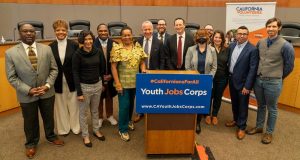By Antonio Ray Harvey, Maxim Elramsisy, Lila Brown and Joe W. Bowers Jr.| California Black Media
The 2024 State of Black California Conference, held at UCLA on April 13, brought together about 200 policymakers, advocates, and community members to discuss the challenges and opportunities facing Black Californians.
A key focus of the conference convened by The Black Policy Project, an initiative of the UCLA Ralph J. Bunche Center for African American Studies, along with the California Legislative Black Caucus (CLBC) was the launch of the 2024 State of Black California report – Assessing 20 Years of Black Progress in the Golden State written by the Center for the CLBC.
The attendees were welcomed by UCLA Chancellor Dr. Gene D. Block, Dr. Lorrie Frasure, Director, UCLA Ralph J. Bunche Center for African American Studies, and CLBC Chair Assemblymember Lori Wilson (D-Suisun City).
The report, presented by Dr. Michael Stoll, Professor & Faculty Director of the Black Policy Project, paints a complex picture: While Black Californians have seen modest socioeconomic gains over the past two decades, a significant racial gap compared to White residents persists. The 2024 report builds on the original State of Black California report published in 2007.
Report Details Mixed Progress
The report utilizes an “Equality Index” to show a 21.7% improvement in Black Californians’ outcomes. However, this progress is overshadowed by the fact that Black Californians still have the lowest index score among all racial groups, lagging 30% behind White Californians.
There were some bright spots. Education showed the most significant improvement, likely due to policies that expanded access to universities. Criminal justice reforms also had a positive impact.
Challenges Remain, Particularly Housing
A concerning trend highlighted in the report is the shrinking Black population in California, down from 2.2 million to 2.1 million. High housing costs are pushing Black residents out of urban centers, with only the Inland Empire and Sacramento showing growth. Homeownership among Black Californians has also declined, while rents have risen significantly.
Conference Tackles Pressing Issues
The conference addressed these challenges through a series of panel discussions. Participants in the panels included members of the CLBC, local and state officials, community leaders, and academics. Topics included:
- Community solutions to Los Angeles’ challenges, featuring local leaders.
- A conversation with Los Angeles City Mayor Karen Bass on her efforts to promote equity.
- The intersection of artificial intelligence and its impact on Black Californians.
- Legislative solutions with members of the California Legislative Black Caucus (CLBC).
- California’s leadership in reparations and its potential for national reconciliation. Secretary of State, Shirley Weber, author of California Assembly Bill 3121 that established the Task Force to Study and Develop Reparation Proposals for African Americans was a participant.
The conference also provided opportunities for attendees to engage in meaningful dialogue and brainstorm solutions through breakout sessions on topics like civic engagement, criminal justice, and education.
More about the conference can be found at the event website – (https://sobc2024.com/#homepage)
 Westside Story Newspaper – Online The News of The Empire – Sharing the Quest for Excellence
Westside Story Newspaper – Online The News of The Empire – Sharing the Quest for Excellence




